Also in this letter:
■ Despite cut, Netflix’s prices are in a league of their own
■ Flipkart’s Shopsy enters grocery business
■ Neobank Open acquires Finin in $10 million deal
Rebel Foods budgets $150 million to acquire and scale new brands
Rebel Foods cofounder Raghav Joshi
Rebel Foods, which operates a network of cloud kitchens and digital brands, said it is committing $150 million (about Rs 1,138 crore) for strategic brand investments and acquisitions in India and around the world.
Timeline: It will use this investment pool over the next few quarters as it looks to scale existing partnerships and build new ones with more than 40 Indian and international brands, it said in a statement.
Mumbai-based Rebel Foods, the company behind brands such as Faasos, Behrouz Biryani, Ovenstory Pizza and Mandarin Oak, turned unicorn in October after raising $175 million in a round led by Qatar Investment Authority.
Soon after, the company said it planned to launch its IPO in the next 18-24 months. We also reported in October that Rebel Foods plans to expand globally through its partnership with Foodpanda.
On cloud nine: India’s cloud kitchen sector has seen heightened deal activity in recent months. Wow! Momo Foods recently raised about $17 million and is planning an initial public offering (IPO).
EatClub Brands, which raised $40 million from Tiger Global, will use part of the proceeds to invest in brands.
Cloud kitchen company Curefoods, which operates EatFit, is in talks to raise $30 million in an equity funding round to acquire almost half a dozen smaller brands. It has already acquired seven new direct-to-consumer food brands.
Room to grow: The online penetration of food services in India is set to double by 2025, clocking a gross merchandise value of nearly $13 billion, management consultancy RedSeer Consulting said in a report on August 30. Gross Merchandise Value or GMV is the total value of goods sold over a given period of time before deduction of fees or expenses. It is a key performance metric for online businesses.
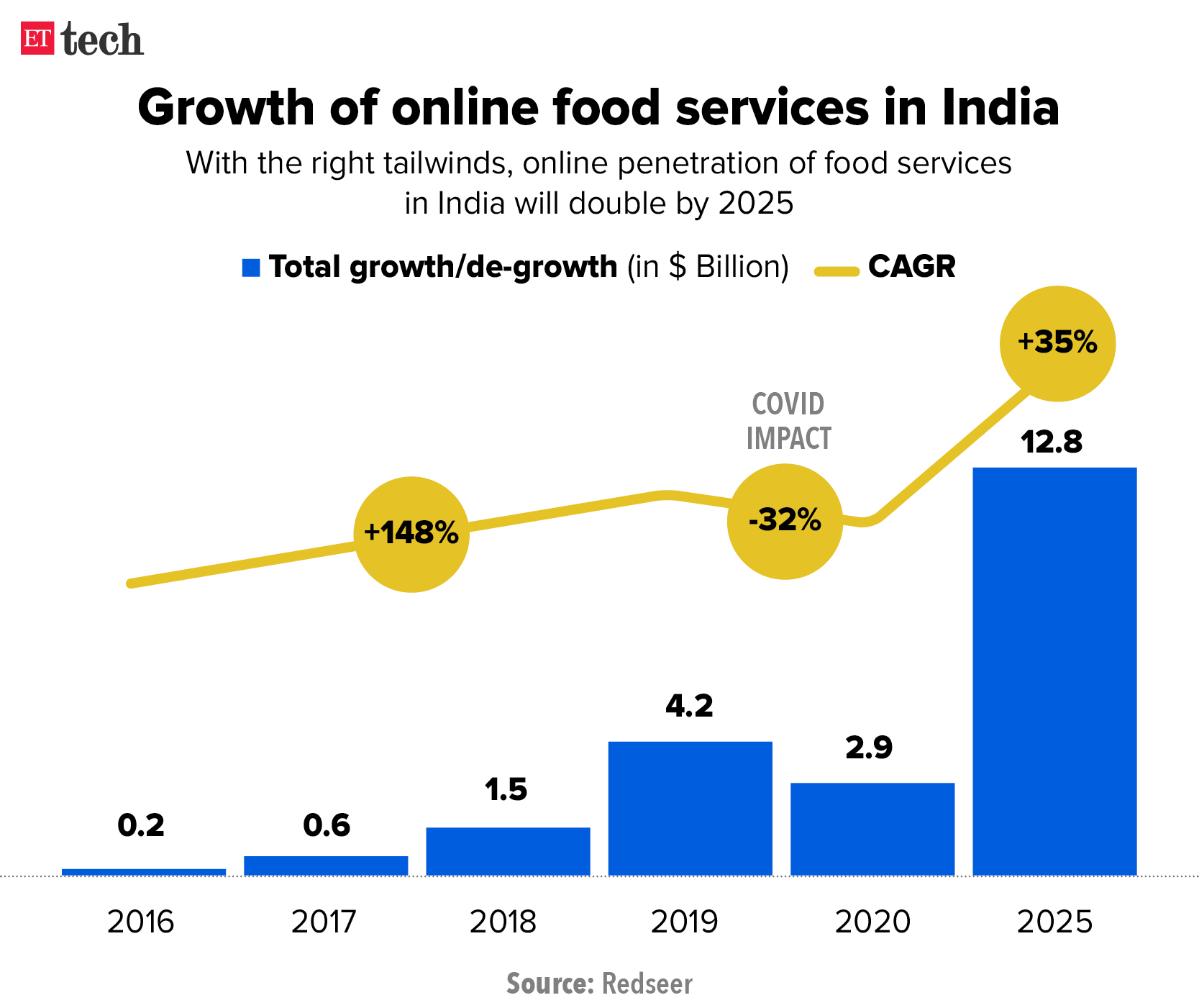
Despite multi-million-dollar fundraisings, India’s online food industry has a long way to go, as the market remains severely underpenetrated when compared to the US and China.
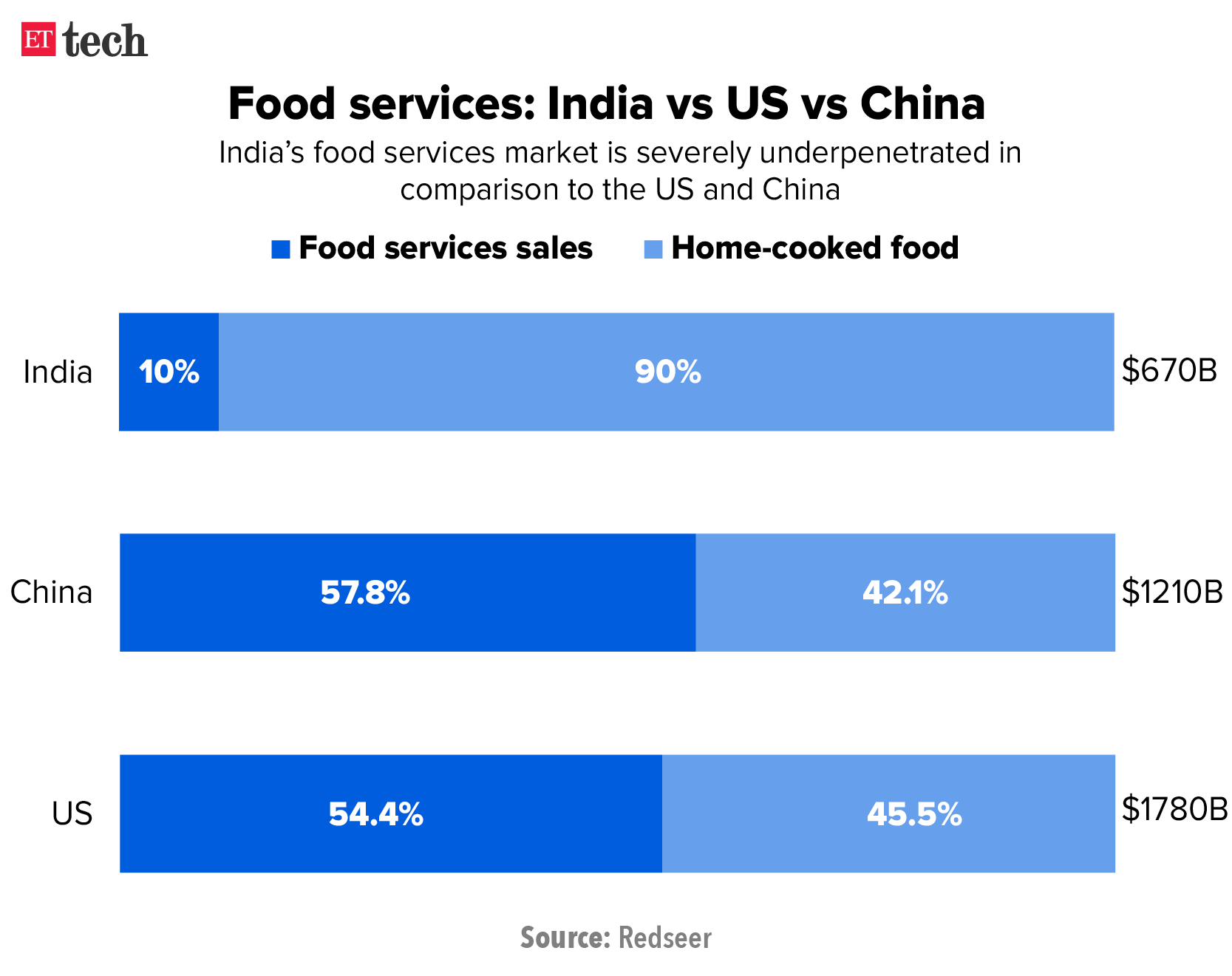
Within the food delivery space, it is the standalone restaurants that dominate. This also represents a significant opportunity for online food delivery platforms to aggregate supply on their platforms, similar to what happened in China.
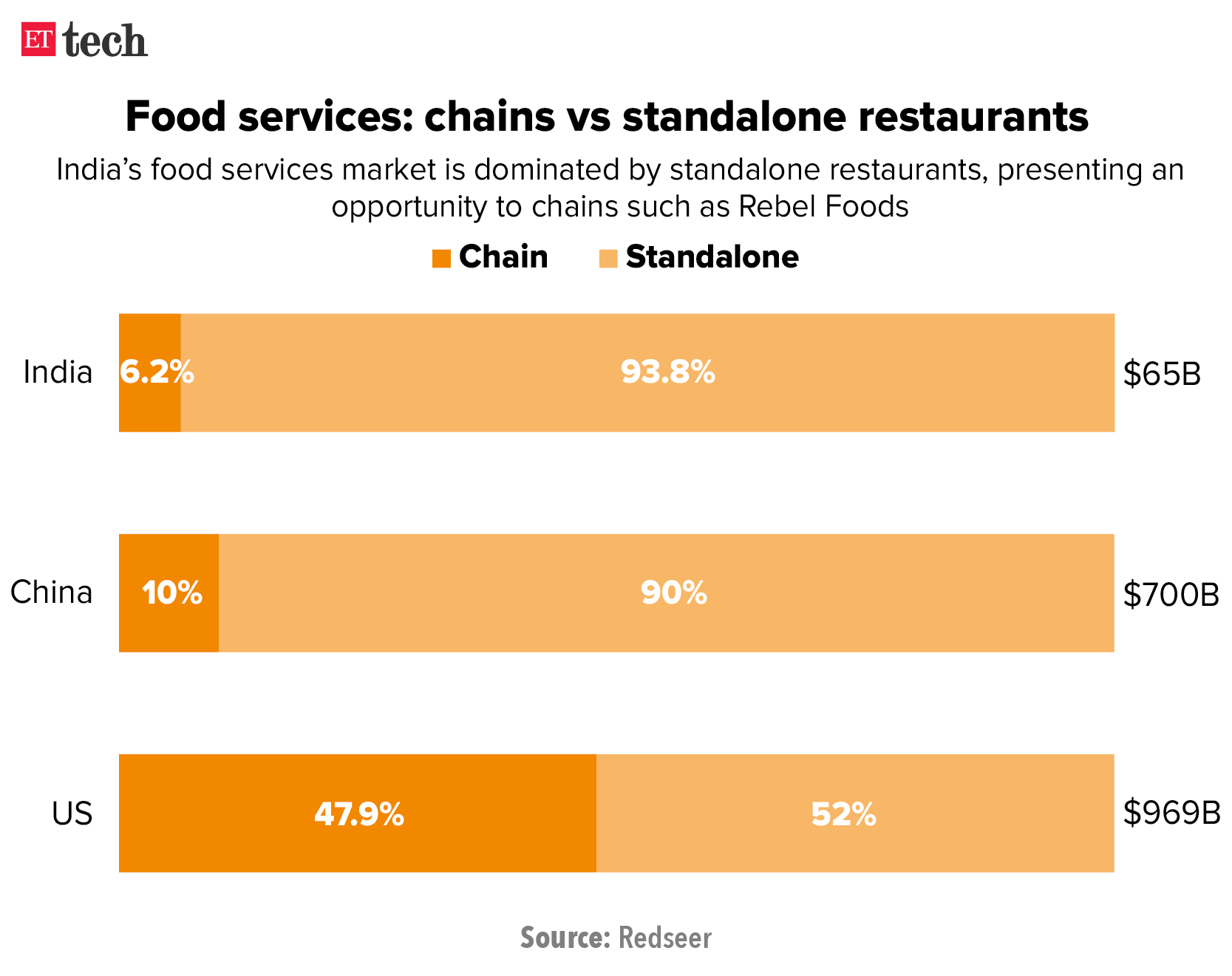
Despite price cut, Netflix’s rates remain in a league of their own

Netflix announced on Tuesday that it was reducing the price of its subscriptions in India to boost its user base. The timing was no coincidence, as rival Amazon Prime Video had previously announced an increase in its prices effective Tuesday.
Despite Netflix’s price cut and Prime Video’s hike, the former remains in a league of its own, price-wise, in India’s video streaming market.
New prices: The price of Netflix’s cheapest monthly plan, which covers phones and tablets, has been slashed 25% from Rs 199 to Rs 149. The largest price drop is for the basic full-service plan, which comes in standard definition (480p) picture quality. It is now priced at just Rs 199 a month, a 60% cut from Rs 499.
The cost of the standard plan, which comes in high definition 1080p picture quality, has been cut from Rs 649 to Rs 499 a month. The full-service premium plan, which offers 4K+HDR picture quality, is down from Rs 799 to Rs 649.
Netflix is still five times the cost: Netflix’s cheapest plan, which is available only on mobiles and tablets, still costs Rs 1,788 a year, more than the most expensive offerings Prime Video, Disney+ Hotstar and any other Indian player. Its most expensive plan on the other hand works out to a whopping Rs 7,788 a year, more than five times the Rs 1,499 that Prime Video and Disney+ Hotstar charge for their top annual plans.
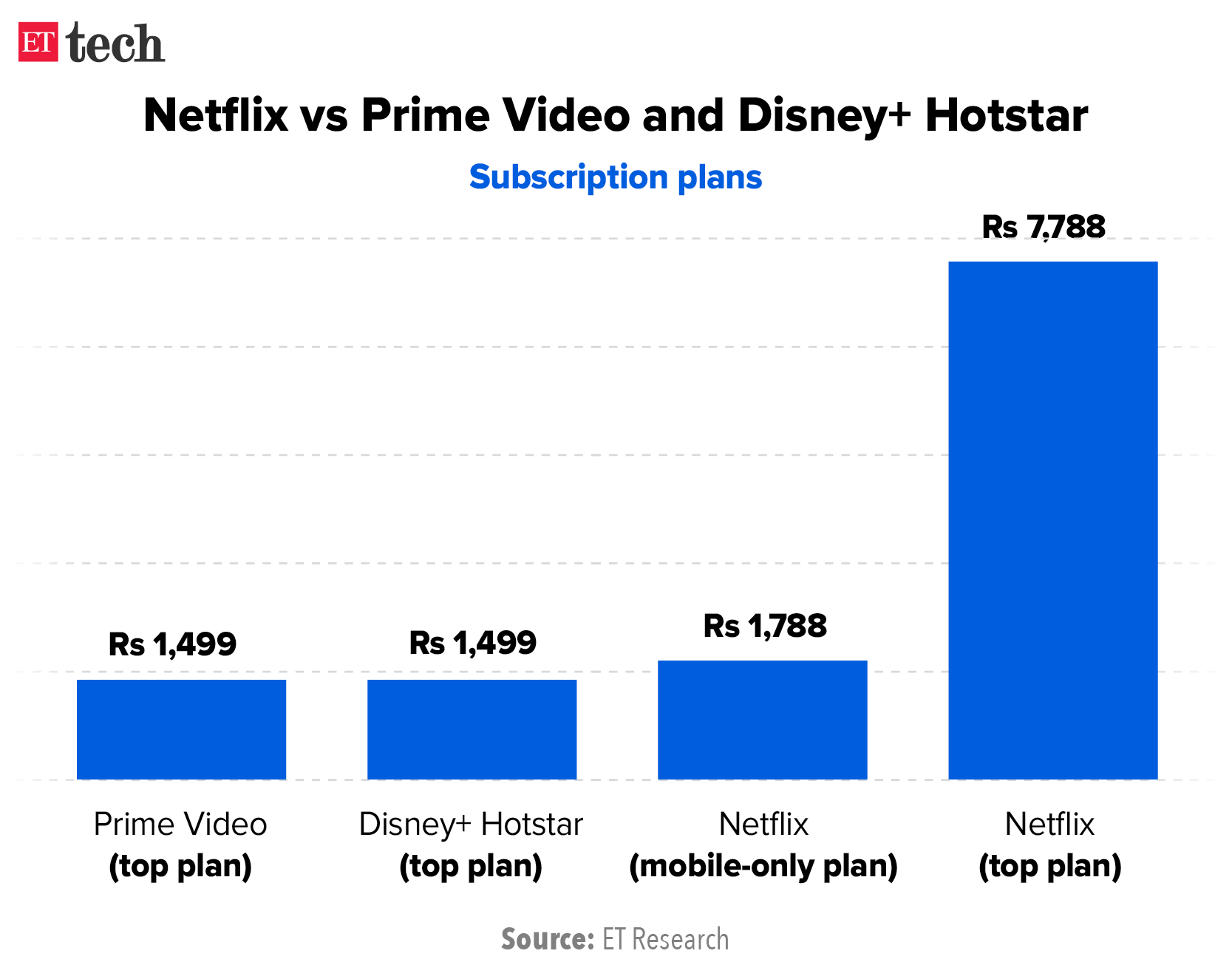
OTT rivals: Amazon Prime Video, on the other hand, is increasing its rates from today. The cost of the annual subscription plan is up 50% from Rs 999 Rs 1,499. The monthly plan, which used to cost Rs 129, will now cost Rs 179, while the cost of the quarterly plan has been raised from Rs 329 to Rs 459.
Disney+ Hotstar introduced new annual plans in September. The cheapest plan costs Rs 499 a year and is for mobiles only. The Rs 899 annual plan covers any two devices, while the Rs 1,499 annual plan offers up to 4K picture quality across up to four devices.
Booming market: India’s video streaming market is expected to touch $12.5 billion by 2030 from about $1.5 billion in 2021 on the back of access to better networks, digital connectivity and smartphones, said a report by RBSA Advisors in July.
Flipkart’s Shopsy enters grocery business to take on DealShare, Meesho

Flipkart said on Tuesday that it has started offering groceries as a category on its five-month-old social commerce platform Shopsy.
Details: Groceries on Shopsy will be available across 700 cities, spanning over 5,800 pin codes. The platform will have 6,000 products across 230 categories such as staples, FMCG, and other dry groceries, matching the selection and range available on Flipkart Grocery. The platform will offer a flat 5% commission margin to its resellers.
An increasing number of companies are now selling groceries through the social commerce model. DealShare has been a prominent player while Meesho has been doubling down on groceries through Farmiso. We previously reported that Udaan has also entered the space through Price Company.
Change of plan: When Flipkart launched Shopsy in July, the company specifically mentioned that it would not offer groceries. The change in plan is similar to that of Grofers, which a few months ago pivoted to quick grocery deliveries. On Monday the company changed its name to Blinkit, saying it was looking beyond groceries and saw itself as a quick delivery company.
Zomato appointments: Meanwhile Food delivery platform Zomato announced the appointments of Nitin Savara as deputy chief financial officer and Anjalli Ravi Kumar as chief sustainability officer.
Savara, who was earlier a partner at EY, will work with chief financial officer Akshant Goyal, the company said. His core areas of expertise are finance, tax, M&A and deal structuring, it added. Kumar, a Harvard Kennedy School alumnus, earlier worked at Unilever as its global sustainability director. She’s also worked with KPMG’s Climate Change Advisory practice in the past.
Neobank Open acquires Finin in $10 million deal

Open’s founders
Google-backed neobank Open said it has acquired consumer neobanking platform Finin in a $10 million cash-and-stock deal. Open, which raised $100 million in October, will use Finin to strengthen its enterprise business and take it overseas in a significant way after this deal, its cofounder Anish Achuthan said.
Quote: “Our enterprise solution has seen strong demand in India with 14 of Indian banks using our product to power their SME neobanking platforms. We are seeing demand from countries like Vietnam, Philippines and Finin acquisition will help us there,” said Achuthan.
According to Open, the acquisition will also further enhance its no-code embedded finance platform Zwitch.
Also Read: Neobanks, the next evolution of banking
Tell me more: Founded in 2017, Open offers a neobanking platform that integrates all the tools used by small businesses with a business current account. It has around 200,000 SMEs on its platform and processes over $24 billion in gross transaction volume annually. The company said it is adding 90,000 new SMEs to its platform each month.
Founded in 2019, Finin was among the first consumer-focused neobank to offer a savings account to consumers. Suman Gandham and Sudheer Maram are the founders of Finin, which was backed by Unicorn India Ventures and other angel investors.
Other done deals
■Former Indian cricketer Sachin Tendulkar has joined pre-owned car retailing platform Spinny as a strategic investor and lead brand endorser, the company said today. Spinny, however, did not disclose the amount Tendulkar invested.
■ Evenflow Brands, an ecommerce rollup, has raised undisclosed funding in pre-Series A round from early-stage investors including Village Global, Venture Catalysts and 9Unicorns. The investment in Evenflow marks Village Global’s entry into the Indian e-commerce aggregator space.
Nike buys virtual sneaker maker in metaverse push
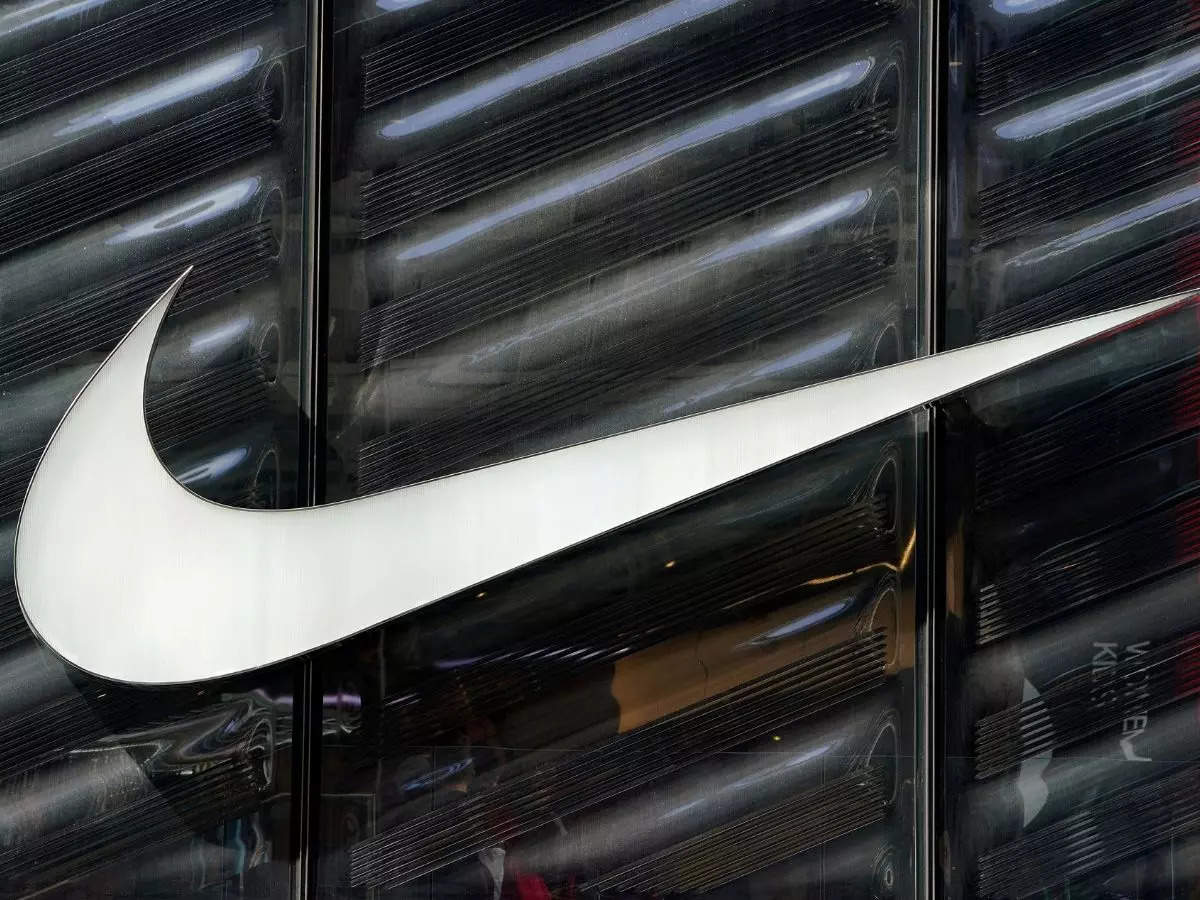
Nike Inc said it has acquired virtual sneaker company RTFKT for an undisclosed sum, as the sportswear giant looks to quickly expand its footprint in the fast-growing “metaverse”.
Also Read: What is the metaverse and why is everyone talking about it?
Latest entrant: Last month, Nike became one of the first big brands to enter the metaverse, which gained prominence after Facebook Inc recently rebranded itself to Meta Platforms Inc.
- Formed in 2020 by Benoit Pagotto, Chris Le and Steven Vasilev, RTFKT also makes NFT collectables and memes.
Quote: “This acquisition is another step that accelerates Nike’s digital transformation and allows us to serve athletes and creators at the intersection of sport, creativity, gaming and culture,” Nike chief executive officer John Donahoe said.
Intel’s metaverse plans: In their first public comments on its metaverse strategy, Intel executives said that the firm is working on software that will help laptops tap into computing power from other devices, including chips from its rivals.
The trend is expected to require vastly more computing power, and firms like Nvidia, which makes chips and software used to construct the virtual world, and Qualcomm, which makes chips used in VR headsets, have both gained value in recent months on investor enthusiasm about the metaverse.
$60 million deal for Meta name rights: Meta Platforms Inc., the owner of social media network Facebook, is behind a $60-million deal to acquire the trademark assets of US regional bank Meta Financial Group.
It’s all in the name: The deal underscores how valuable the Meta name has become for the technology giant, which is betting that its focus on the metaverse—shared digital spaces accessed via the internet through an array of devices—will pay off handsomely in the coming years.
Meta Financial had said in a regulatory filing that a Delaware company called Beige Key LLC agreed to acquire the worldwide rights to its company names for $60 million in cash. It did not disclose who the owner of Beige Key was.
“Beige Key is affiliated with us and we have acquired these trademark assets,” a spokesperson for Meta Platforms said.
Today’s ETtech Top 5 newsletter was curated by Arun Padmanabhan in New Delhi and Zaheer Merchant in Mumbai. Graphics and illustrations by Rahul Awasthi.
























